At DiMasi's corruption trial in Boston, Harkins testified DiMasi told her that if education commissioner David Driscoll would support such a program, "he would make sure Bobby DeLeo put it in the budget."
![Salvatore DiMasi 2008.jpg]() File photo | The RepublicanFormer Massachusetts Speaker of the House Salvatore DiMasi is on trial in federal court in Boston on corruption charges.
File photo | The RepublicanFormer Massachusetts Speaker of the House Salvatore DiMasi is on trial in federal court in Boston on corruption charges.By KYLE CHENEY
BOSTON – Former Rep. Lida Harkins testified in federal court Thursday that former Massachusetts House Speaker Salvatore DiMasi approached her years earlier with a simple request: seek out David Driscoll, then commissioner of education, and ask him if he would support a proposal to fund data collection software.
But DiMasi didn’t stop there, Harkins – a longtime senior lieutenant to DiMasi who worked as majority whip during his speakership – told a jury at the Moakley Courthouse on the Boston waterfront. Rather, she said, he told her that if Driscoll would support such a program, “he would make sure Bobby DeLeo put it in the budget.”
Robert DeLeo, at the time of DiMasi’s request, was the chairman of the House budget committee, responsible for vetting and revising most spending legislation. When DiMasi stepped down in January 2009 amid suggestions he traded the power of his office for bribes, DeLeo, who had been a trusted deputy to DiMasi, was quickly elected speaker.
For Harkins, obtaining funding for education data collection software was the fulfillment of a long-held goal – to better organize student performance data in order to help craft well-informed policy – which she testified had been a priority for her since at least 2000, when as co-chair of the Education Committee she was tasked with rewriting special education laws.
“It was very difficult to set policy without having that kind of data available,” she said, blaming personnel cutbacks during the Romney administration for the shortage of education information data.
![2006 lida harkins.jpg]() File photo | The RepublicanLida Harkins
File photo | The RepublicanLida HarkinsHer testimony, delivered at the behest of the prosecution in the corruption trial of DiMasi and two associates, highlighted the moment prosecutors allege that DiMasi put in motion a scheme to steer millions of dollars in taxpayer-funded contracts to Cognos Corp., a Canadian company, in exchange for tens of thousands of dollars in kickbacks. Lobbyist Richard McDonough and accountant Richard Vitale, both close friends of DiMasi who are also charged in the scheme, allegedly received six-figure sums from Cognos for their efforts as well.
Eventually, in 2006, Cognos was awarded a $4.5 million contract to provide an “education data warehouse” application to Massachusetts, the first of two contracts that Cognos won during DiMasi’s tenure totaling $17.5 million. At the same time, prosecutors allege, DiMasi had been collecting $4,000 a month from Cognos, funneled through his law associate, Steven Topazio, who was signed to a $5,000-a-month consulting contract with Cognos but was never asked to perform any work.
DiMasi, McDonough and Vitale are charged with conspiring to defraud taxpayers, mail fraud and wire fraud. DiMasi is also charged with extortion. A fourth defendant, Joseph Lally, who sold software for Cognos during DiMasi’s tenure as speaker, pled guilty in February and has pledged to cooperate with prosecutors in exchange for a more lenient sentence. Lally is expected to testify next week.
Defense attorneys for DiMasi, McDonough and Vitale have contended that DiMasi’s pursuit of Cognos was a high-minded attempt to improve the state’s education system and that the money he collected from Topazio was the resulting of a long-standing – and legal – fee referral arrangement between the two men. Thomas Drechsler, McDonough’s attorney, said McDonough had only been paid for legitimate lobbying work.
Harkins’s testimony underscored the degree to which Beacon Hill figures on the margins of DiMasi’s alleged plot may be drawn into the storylines unfolding in a week-old trial expected to last until the middle of June. Now a reprecincting specialist in the office of Secretary of State William Galvin, she appeared to have a shaky recollection at times, failing to recall what year DiMasi became speaker – it was 2004 – and wavering for a few seconds when asked to recall whether 2006 was an election year.
While he was waiting to testify, Harkins was seated on a bench outside the courtroom. Durign a break in the trial, DiMasi walked past her without ever making eye contact or glancing in her direction. McDonough, following closely behind, looked in her direction and said, “Hi, Lida,” before returning to the courtroom.
Speaker DeLeo has been battling to regain public confidence in governmental institutions since he took office in January 2009. Harkins’s testimony, for the first time in the trial, placed DeLeo in the sequence of events that led to Cognos’s successful bid for state business.
DeLeo’s role – or lack thereof – in the crafting of legislation that ultimately benefited Cognos was a factor in 2009, when DiMasi resigned under an ethical cloud and DeLeo vied with Norwood Democrat John Rogers for the speakership.
As a vote neared to choose the next speaker, eight of Rogers’s allies urged colleagues to delay a vote until DeLeo’s role in the controversies that had been dogging DiMasi had been further explained. Those members – only three of who are still sitting in the House: Reps. Robert Koczera (D-New Bedford), Thomas Calter (D-Kingston) and Colleen Garry (D-Dracut) – described “grave concern” among their colleagues about DeLeo’s involvement in the “Cognos budget item.”
“Representative DeLeo has never been contacted by any officials concerning the controversy over Cognos,” a DeLeo spokesman responded at the time.
DeLeo’s chief of staff, James Eisenberg, is slated to testify Monday in the trial. Eisenberg was DeLeo’s chief of staff when DeLeo chaired the Ways and Means Committee under DiMasi.
DiMasi’s lawyer, Thomas Kiley, is seeking to prevent the prosecution from introducing a page from Eisenberg’s personal notes during the crafting of the fiscal 2007 budget. In his notes, Eisenberg wrote “Ck w/Speaker” next to the budget amendment that funded the education data warehouse. According to Kiley, those words were crossed out.
“It is prejudicial as it is intended to indicate the Speaker’s personal involvement in the particular amendment even though the declarant who made the note has no memory of such involvement,” Kiley wrote in a memo to Judge Mark Wolf. “The document is neither a business nor government record; it was produced by James Eisenberg individually, not the House Committee on Ways and Means and is instead a single page from the booklet he personally carried.”
Prosecutors countered in their own filing, contending that Eisenberg’s notes should be admissible because Eisenberg “will testify that the line through the “check w/ Speaker” note indicates that he either checked with DiMasi directly or checked with a person on his staff before the recommendation was made to include the [Education Data Warehouse] line item” in the House’s education budget amendment.





























